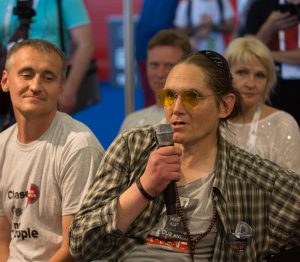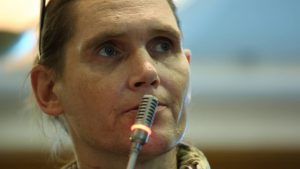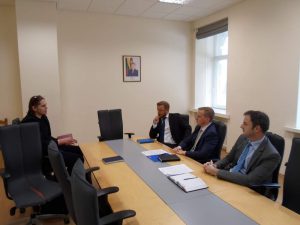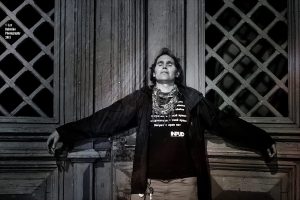EHRA presents a series of conversations with people whose names and roles in harm reduction are well known in the region of Central and Eastern Europe and Central Asia, and beyond. They will share with us the most valuable – their experiences, thoughts, memories.
 Kestutis Butkus is a well-known activist, one of the first from the community of people, who use drugs in Lithuania. 8 years ago, his right to health was violated by non-provision of opioid substitution treatment (OST) in prison (at that time, Lithuania remained one of the few EU countries where OST was inaccessible to people in prisons). Kestutis chose the path of struggle against the system and not because of, but rather in spite of, became one of the few (alas), who managed to influence the Law. Since 2018, opioid substitution therapy has been introduced in Lithuanian prisons, but we need to remember – this is only the beginning of a long way* …
Kestutis Butkus is a well-known activist, one of the first from the community of people, who use drugs in Lithuania. 8 years ago, his right to health was violated by non-provision of opioid substitution treatment (OST) in prison (at that time, Lithuania remained one of the few EU countries where OST was inaccessible to people in prisons). Kestutis chose the path of struggle against the system and not because of, but rather in spite of, became one of the few (alas), who managed to influence the Law. Since 2018, opioid substitution therapy has been introduced in Lithuanian prisons, but we need to remember – this is only the beginning of a long way* …
– What were the circumstances of your arrest in 2011?
– Eight years ago, police “apprehended” me by accident – they found a couple of grams of marijuana in the car. I had several outstanding fines at that time and the judge decided to sentence me to forty-five days in detention so that I would fully comprehend my crime. “Let him lie down and think,” she said. At the trial, I mentioned the methadone program, as I had been receiving substitution therapy for ten consecutive years, to which the judge’s reaction was: “This is outside our competence”.
– Wow. Did you agree with that ruling?
– I appealed, but my appeal was prepared by a person without a license (it used to be possible to do it that way) and then I was put on the wanted list. I didn’t know anything about it. Then one day I came to the migration services to collect my passport. First, they locked me in a room, then a convoy arrived and escorted me to prison. First to pre-trial detention, then to Lukiškės (a prison in Vilnius – comment by EHRA). During all that time no one really explained anything to me. I started writing letters – asking “what for”? There was no answer. Then I found out that those were the forty-five days of detention. It turned out nobody actually read my appeal, they didn’t even consider it. The court ruling came into force, which meant I had to be in prison.
On the first day of the detention, a doctor came to examine me, and I asked for methadone. The doctor, whose name was Mendelevich, said: “You’ll find it very hard – we don’t have a program here. I can only transfer you to the prison hospital, but everything is the same there, except that the ward is more spacious, and smoking is forbidden. You still won’t get methadone though, I can only prescribe “cockroaches”.
– What is it?
– We call light psychotropic substances “cockroaches”. They’re prescribed to everyone so that people can withstand imprisonment, but they have nothing to do with substitution therapy. I began to write appeals, requests, but there was no response.
– Do you remember the prison conditions well?
– Lukiškės is an old prison, it was built in the XIX century. At that time, it was considered one of the most modern in the Russian Empire (at that time most of Lithuania was under the Russian rule — comment by EHRA). These days however it falls short of the standards provided at similar institutions in the European Union. The cells are cramped, for four, there is a table, a washbasin and a toilet. Restriction of freedom is in itself a terrible thing, and those conditions make it simply indescribable. The first eight days were awful. I couldn’t sleep, I started suffering from claustrophobia, though I never had it before. I only managed to get through those moments because I could see a piece of the sky and some rooftops through the bars on the window. I was also lucky to have just one other inmate in my cell, not three (my neighbour was also from the community, by the way, but by that time he had gone through withdrawal).
– Did you spend your entire detention in Lukiškės?
 – After eight days I was transferred to another prison – Provinishki (80 km from Vilnius – comment by EHRA). Once there I also immediately mentioned that I was on substitution therapy. The doctor’s answer was: “Don’t complain about your addiction. It’s dissoluteness, not illness.” I understood everything… I said: “I don’t need anything. Just prescribe me some aspirin to thin the blood” (I have a heart valve). They gave it to me, along with “cockroaches”. I was left in a one-person cell for fourteen days. All by myself, having bouts of insomnia…
– After eight days I was transferred to another prison – Provinishki (80 km from Vilnius – comment by EHRA). Once there I also immediately mentioned that I was on substitution therapy. The doctor’s answer was: “Don’t complain about your addiction. It’s dissoluteness, not illness.” I understood everything… I said: “I don’t need anything. Just prescribe me some aspirin to thin the blood” (I have a heart valve). They gave it to me, along with “cockroaches”. I was left in a one-person cell for fourteen days. All by myself, having bouts of insomnia…
– Did anyone know you were in prison without access to methadone? Were you allowed to have visitors?
– I was allowed to see a lawyer for the first time in Proviniski – my ex-wife contacted Emilis Subata (Dr. Emilis Subata, Director of the Vilnius Center for Addictive Disorders). He in turn contacted the “I Can Live” Coalition (Vilnius, Lithuania), as I was their member. They managed to hire legal protection for me. Then we thought that this incident could set the wheels in motion for the introduction of OST in Lithuanian prisons. At that time, civil society had been trying unsuccessfully for more than ten years to discuss the matter with the prison department of the Ministry of Justice.
– What measures did the solicitor take?
– He prepared a petition to the prison authorities demanding that they provide me with methadone and requesting a written reply. As a result, a psychiatrist came to see me … (Interestingly, it was only then that I learned that such a specialist was available in prison). He began to reason with me. I said: “Don’t talk, give me a letter.” It was exactly that that acted as a “catalyst” for the whole process. When I was released forty-five days later, the Coalition’s human rights lawyers read the prison’s reply and confirmed that it could be used to refer the case to court, and that we had a chance to overhaul the system. As for my condition… I couldn’t return to the substitution program for a year after my release. I thought I had dealt with withdrawal and that I was able to pull through but I was wrong. I often left the city to see my friends or went to the forest — I didn’t want my daughter (she was still a teenager then) to see what was happening to her dad.
– When did you manage to become stable?
– It was only after a year that I was able to return to the program. That’s when my “marathon” started. First, we went to the local court – they ruled against me. Then we went to the district court, then to the Appeals court – with the same result. Six years later we reached the Supreme Court.
– What was the ruling?
– Same as before. That’s why we wrote to Strasbourg, to the European Court of Human Rights (ECHR). The court looked into our case, registered it with a number and accepted it for consideration. The ECHR works according to the following procedure: there are two Chambers. The first one determines whether all opportunities have been exhausted at the national level (in our case it was a yes). And if so, transfers the case to the second Chamber. As soon as that happened, the Lithuanian State literally “woke up” – representatives of the Ministry of Justice, the management of the two prisons I had been in, and the Ministry of Health. Six years on, the Ministry of Health suddenly “remembered” that they had a damage recovery commission, which was to be contacted no later than two weeks after an incident. Of course, I had not contacted the commission. I filed an appeal to the Supreme Court of Lithuania for a retrial based on that fact. It stalled the whole process.
– What was the reaction in Strasburg?
 – The ECHR wrote to my lawyers asking what was going on. Lawyers reported that the Ministry of Health had taken the case to court. Upon learning that Strasbourg suspended the case pending clarification.
– The ECHR wrote to my lawyers asking what was going on. Lawyers reported that the Ministry of Health had taken the case to court. Upon learning that Strasbourg suspended the case pending clarification.
– Circles of Hell all round…
– Another year went by. In 2018, the Supreme Court acknowledged that I was the injured party. The damage caused to me was estimated… at three hundred euros, plus a bit more for the lawyers and redress – the court admitted I had been right. We appealed those three hundred euros – the court added another thousand on top and just over a thousand for my defence. However, after talking to my lawyers, I decided not to stop there and filed an appeal to Strasbourg over other violations – conditions of detention, standards of hygiene and size of the cell. In the West, such conditions constitute torture.
Last summer, Strasbourg accepted my case. Based on international case law, the lawyers requested thirty-five thousand euros in compensation. And I want to add – that is not a huge amount. There were similar cases in Poland and the UK, where the compensation was about a hundred thousand or more.
– If ECHR rules in your favour, who’s going to be liable for compensation?
– The state. To be more precise – the Justice Ministry. The most important thing for me however is not the decision of the Lithuanian court or the ECHR, but the fact that my case resulted in the passing of a law on the provision of OST in Lithuanian prisons. This is a real victory. Our common advocacy driving force.
– That is, from now on, if someone in need of methadone is put in jail, they’re going to get it there?
– In prison, remand prison, temporary detention facility – everywhere. The law applies to anyone detained for two or more days. There is a catch though. Only those who are officially enrolled on the OST program can receive methadone. We won’t leave it as it is though – the community is putting pressure on the prison department writing letters asking to amend the law and I hope we will be heard.
– Why do you think it took the prison department years to resolve the issue of access to life-saving treatment in prisons? Ruining hundreds of lives along the way – of those who didn’t dare to stand up to the system. Was it money?
– The prison department have a healthcare department within it. And the healthcare department thought that introducing OST in prisons was a very complicated and costly process. They argued that they needed millions to do it. I remember another argument of theirs – where would they keep methadone in prison, it requires special storage conditions! Where else if not in prison! What could be easier than designating a room and installing a methadone dispenser! Implementing the program did not require any significant funds. Who knows though, maybe the prison department just wanted to get some extra money from the Justice Ministry? They are like a state within a state, aren’t they – they report to it but at the same time are independent. They even have their own special internal system, ranks and epaulets.
– It’s like an iceberg then – you can see the reasons that are at the top, that’s 10 per cent, but there are more issues underwater which account for the remaining 90 per cent of barriers.
 – I’ll give you another example. They opened the so-called rehabilitation centre for drug users at a prison in Alytus (town in Lithuania – comment by EHRA.) They constructed a building for it especially, furnished it with everything new. Guess who’s moved in there? The entire bunch of the prison’s top dogs, inmates who have nothing to do with the rehabilitation program. Furthermore, they were selling drugs from there for a few years. You think the prison authorities didn’t know that? After all, it’s no secret that drugs are available in prisons at crazy prices. How could such amounts of drugs filter their way into institutions without some help on the inside, from the staff? –
– I’ll give you another example. They opened the so-called rehabilitation centre for drug users at a prison in Alytus (town in Lithuania – comment by EHRA.) They constructed a building for it especially, furnished it with everything new. Guess who’s moved in there? The entire bunch of the prison’s top dogs, inmates who have nothing to do with the rehabilitation program. Furthermore, they were selling drugs from there for a few years. You think the prison authorities didn’t know that? After all, it’s no secret that drugs are available in prisons at crazy prices. How could such amounts of drugs filter their way into institutions without some help on the inside, from the staff? –
The introduction of the methadone program has slashed the numbers of paying “clientele”. Therefore, my answer about the reason for such a disastrous delay in the implementation of OST in prisons sounds simple – “not profitable.” And I’m happy that my case managed to break the deadlock.
* – According to the Report by the European Committee for the Prevention of Torture and Inhuman or Degrading Treatment or Punishment (CPT) from 2018: “…at Alytus, Marijampolė and Pravieniškės Prisons… Opioid substitution treatment was still not available in prisons visited. As in the past, methadone maintenance treatment was continued for persons in police custody but discontinued after their transfer to a prison. Further, there was still nothing on offer in terms of harm reduction, such as a syringe and needle exchange, distribution of condoms, etc.” https://rm.coe.int/168095212f
